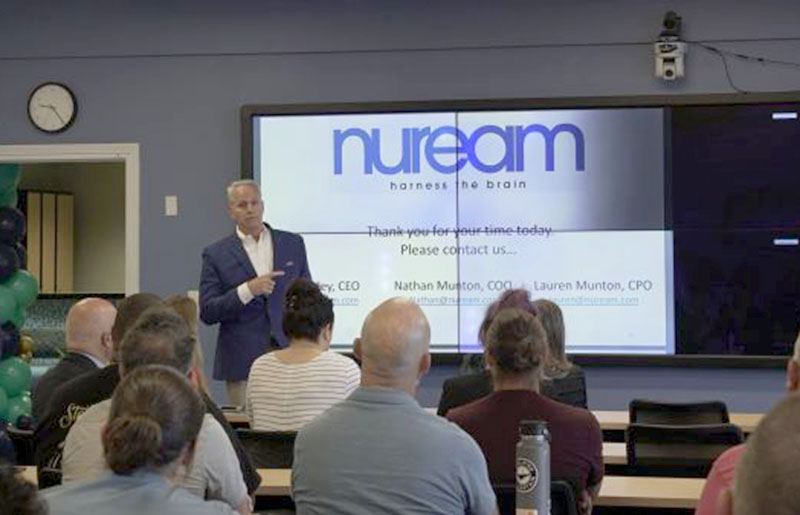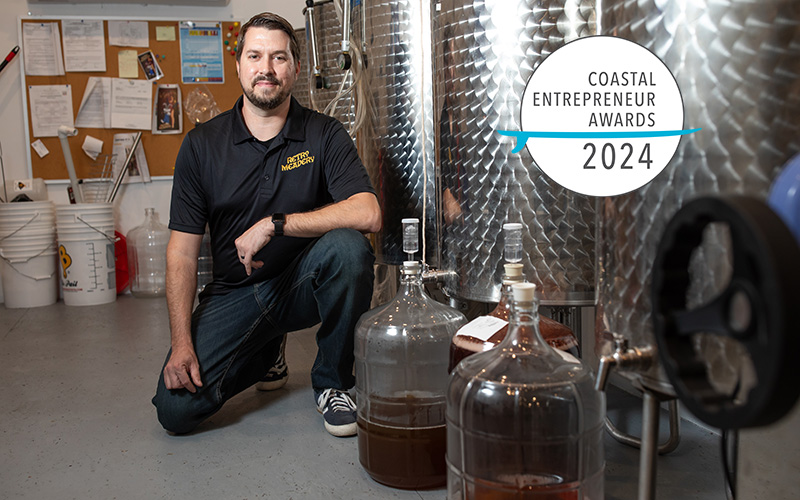Wilmington-based neuroscience company Nuream wants to measure your brain’s data while you sleep.
Collecting brain data is not new, CEO Robert Cooley said. The electroencephalogram, or EEG, has been the method of choice for years. But to collect data, subjects must wear headbands or a cap with non-discreet sensors. In other words, the devices currently used to collect brain data are not usable day-to-day, he said. This is what he hopes to change with Nuream.
In a broader sense, the technology Cooley is working on with the University of North Carolina Wilmington will use AI to monitor brain activity during sleep and create a data dashboard displaying brain activity insights. Later iterations of the product could be used to detect neurological episodes like seizures early.
Wilmingtonians Nathan and Lauren Munton founded the company, which is in the early stages of research to develop its first-generation prototype. As a member of UNCW’s Center for Innovation and Entrepreneurship, Cooley works with UNCW professors and students to research brain science and possible application methods.
After several meetings with Ron Vetter, dean of UNCW’s College of Science and Engineering, research began during the fall 2023 semester.
A couple of faculty members and students across the computer science and health and life sciences departments are researching existing sensing capabilities and AI to see what data is needed to complete the company’s prototype, Vetter said.
Cooley and Vetter said a prototype will likely be available this spring. Next semester, research will likely include testing different sensors for the prototype.
Using fabric as a sensor is the plan, Cooley said. The company is developing fabric made of conductive fibers that act as a sensor instead of sensors sewn into the fabric. This smart fabric can be used to make pillowcases for sleep monitoring, then eventually T-shirts for daily tracking of other biometric data, he said.
The company recently established a Simple Agreement for Future Equity, or SAFE Agreement, with its investors that determines the conditions of how invested capital will manifest as equity. Cooley said the initial investments will help fund sponsored research through UNCW and legal fees associated with protecting intellectual property.
Nuream’s first prototype will not be a diagnosing device, Cooley said. He wants to create a low-risk FDA device like a Fitbit or other biometric-measuring wearable device, then work toward an FDA 510(k) medical device clearance in the next couple of years.
Entering the market using sleep data is advantageous for the company because sleep provides insight into the brain’s overall function, he said, allowing users to conduct sleep studies for themselves.
Research going into the prototype consists of brain data in the public domain, which Vetter said will most likely need to be augmented with additional data collection by UNCW. Students and faculty are researching algorithms that can use brain wave activity to accurately identify sleep phases, fabric options for further sensor development and data privacy and encryption.
Cooley made a personal connection from the company’s mission to his almost 40-year career in the military, which he retired from last year. He suggested a possible evolution of Nuream technology could help those with Post Traumatic Stress Disorder stop neurological reactions to stimuli before they happen.
Cooley met with Revolution Capital and Rise of the Rest’s David Hall at the Network for Entrepreneurs in Wilmington’s event in November. He was one of five Wilmington tech startup CEOs selected for 30-minute “office hours” with the venture capital executive. The others were Boreas Monitoring Solutions, OpiAID, Raleon and Telios.
He spoke with Hall about Nuream, although the company is not yet at the stage of needing a venture investment from Revolution Capital. Cooley said the meeting was valuable in building a network with people in the cutting-edge tech space.
In the next five months, Nuream is expected to develop an e-commerce delivery that will outsource existing products that use brain activity to improve sleep through different senses, Cooley said. By selling related goods to its audience while continuing to develop its proprietary technology, he said it may make consumers more comfortable with brain science.




